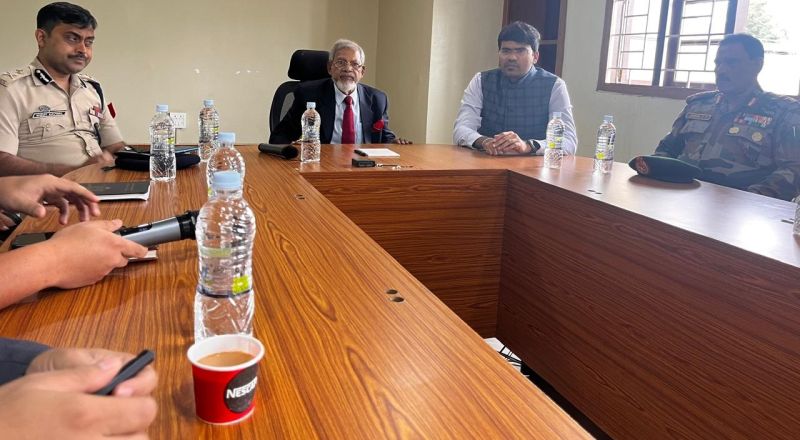Justice UB Saha, Chairperson of the Manipur Human Rights Commission (MHRC), conducted his second visit to Churachandpur district on Wednesday, underscoring the growing concerns over security and human rights in the region. The visit, marked by high-level meetings and on-ground inspections, highlighted the precarious situation in Tengra Meitei Leikai, a Meitei colony that has been severely impacted by the ongoing ethnic conflict in Manipur.
During his visit, Justice Saha convened a crucial meeting with the Deputy Commissioner, the Superintendent of Police, and various civil society organizations (CSOs) in Churachandpur. The primary focus of the discussion was the security of Tengra Meitei Leikai, a locality that has been left vulnerable after its residents were displaced to internally displaced persons (IDP) camps. Justice Saha advocated for the immediate fencing of the area to prevent encroachment and ensure the possibility of resettling the displaced Meitei community.
“The protection of Tengra Meitei Leikai is not just about securing land; it’s about ensuring that the displaced residents have a place to return to,” Justice Saha stated, emphasizing the urgency of the situation. However, officials from the district administration noted that the implementation of such security measures would require consultations with the Hill Council, a governing body in the region.
The conflict in Manipur, particularly in Churachandpur, has seen escalating tensions between different ethnic communities, leading to widespread displacement. Tengra Meitei Leikai, a predominantly Meitei settlement, was one of the areas devastated during the violence. On a previous visit in August 2023, Justice Saha found the colony completely destroyed, with no signs of habitation. The devastation prompted calls for immediate action to protect the area from further degradation and to plan for the return of displaced families.
In addition to security concerns, Justice Saha’s visit also shed light on various challenges faced by the Churachandpur community. During his interaction with CSOs, local leaders raised issues regarding the severe shortage of essential goods in the district. The blockade of supplies from Imphal has exacerbated the situation, leaving residents without access to basic necessities. Despite some goods being transported from Aizawl, the supply remains insufficient to meet the needs of the population.
Another significant concern discussed during the meeting was the situation at Churachandpur Medical College. The Deputy Director of the college highlighted the critical shortage of faculty and professors, which is hampering the institution’s ability to provide quality education and healthcare services. This shortage has further strained the district’s already limited resources, particularly in the context of the ongoing crisis.
Justice Saha also received a complaint from the Eimi Medicos Union regarding the alleged inaccessibility of MBBS seats for students from Churachandpur at regional medical institutes such as RIMS, JNIMS, and SAHS. The union’s general secretary expressed frustration over the lack of opportunities for local students, which they argue is a violation of their rights.
The visit concluded with Justice Saha reiterating the importance of peaceful coexistence among Manipur’s diverse communities. He urged the district administration and local leaders to work collaboratively towards restoring normalcy and ensuring the rights and safety of all residents.
Although the meeting did not yield any immediate resolutions, Justice Saha’s visit has brought renewed attention to the plight of the Meitei residents and the broader issues affecting Churachandpur. His call for the fencing of Tengra Meitei Leikai stands as a critical recommendation, highlighting the need for both short-term security measures and long-term strategies for rehabilitation and peacebuilding in the region.
Justice Saha’s commitment to addressing these issues signals a proactive approach by the MHRC in safeguarding human rights in Manipur, as the state continues to grapple with the complex challenges posed by its internal conflict.



